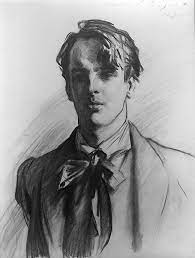
It’s St. Patrick’s Day, which can only mean three things: William, Butler, and Yeats. (You were expecting corned beef, potatoes, and beer?)
One of my favorite lesser-known W. B. Yeats poems is the sonnet “Never Give All the Heart,” which was introduced to me via a Chieftains album (I think there are 573, so don’t ask me which one). Unlike Yeats’ more familiar works, this poem does not demand the experts’ attentions so much or wind up on many syllabi, but I like its homespun lesson and how it speaks to and from the young:
Never Give all the Heart
Lesson #1, lads? Passionate women won’t give you a second thought if your love is taken for granted. No, “everything that’s lovely is / But a brief, dreamy, kind delight.” Maybe one of my favorite lines of all time because I like its feel on the tongue and even better on the the ears.
Plus, “delight” is one of those words poetry’s Praetorian Guard has forbidden poets like me to use. Screw ’em. I have and I will.
Back to never giving all (key word) of your heart: When it comes to love, you have to be a cool cat. You can’t play your part very well “If deaf and dumb and blind with love.” Alliteration. Polysyndeton. But really, who marks such rhetorical flourishes when letting lines like that wash over them?
And the final rhyming couplet of the sonnet? It establishes this particular rube’s expertise. Who could write such a brief lesson on love but one who learned the hard way, one who “gave all his heart and lost”? Better to keep a small part of your love to yourself.
Giving it all to another person like a lovesick fool will leave you bereft if the relationship hits the shoals. Protect yourself, then. Love the next one 90% — 91, tops. That way you’ll have something to hold on to if she leaves.
Romantic with a capital “R”? I’ll say. But in my day, I have always leaned this way.
As for the Chieftains, I did a little I-Tube, YouTube, we all Tube research and found it was none other than Brenda Fricker and Anúna that put the 1904 poem to song.
Erin Go Bragh, is all I can say.
